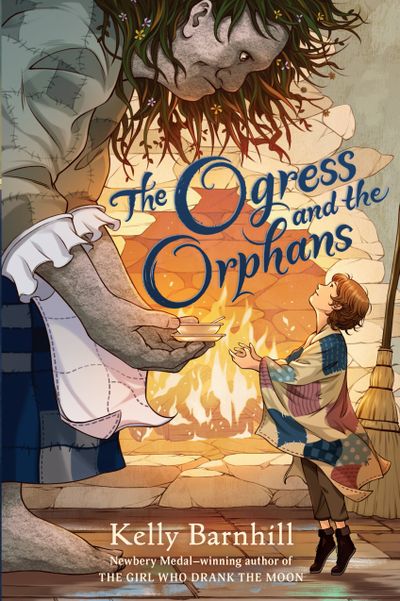In Kelly Barnhill’s new fantasy novel ‘The Ogress and the Orphans,’ no single hero can save the day

What’s big and gray and loves to bake pies? The kindly ogress in “The Ogress and the Orphans,” a new fantasy novel by Kelly Barnhill. Barnhill nixed the human-eating brute of most fairy tales. Instead she created a complex character that makes readers question the stereotype of ogres (and other so-called monsters).
The novel is Barnhill’s first for young adults since winning the Newbery Medal in 2017 for “The Girl Who Drank the Moon.” Like that earlier book, this richly layered story digs beneath surface appearances. What exactly is going on with that large flock of crows, the suspicious villagers, the charming mayor and that secretive ogress? Why is the once-friendly town so divided and full of mistrust?
The book was a big challenge to write, said Barnhill by phone from her home in Minneapolis. Winning the Newbery – the most prestigious award for a children’s book – was an amazing experience, she said, but then she began to wonder if she could write another book. She was full of self-doubt.
Maybe you’ve felt the same way after finishing an incredible gymnastics routine, acing an exam or hitting a game-winning home run. How would you ever be able to do that again or even come close? Barnhill dealt with her doubt by trying to write in longhand every day, creating tales just for herself.
A more fully formed story started to emerge in 2020. This original fairy tale explored both the conflict and the generosity she was seeing in the world around her. She noticed, for example, that throughout the pandemic, some people worked together to protect one another from the coronavirus, and others did not. “I saw the power that one individual has to make something better for another,” she said.
A conversation with her “awesome and interesting” 10-year-old nieces also helped shape the story. The girls’ parents are philosophers. They study knowledge – how people think and reason and how they decide right from wrong. The girls thought that philosophy should also consider kindness and animals.
Barnhill listened. “The Ogress and the Orphans” probes what happens to people’s hearts and to the spirit of their communities when they give to others – or turn away. What happens when they respect and include others – or seek power over them?
And there are lots of animals! Cats, a crow named Harold and a blind dog modeled on the Barnhill family’s beloved rescue dog play key roles. The 15 kids in the rambling Orphan House were especially fun to imagine, Barnhill said. As the oldest of five children, she loved thinking about family dynamics as she created the characters.
Usually fairy tales have one hero, but this book has several, all with different skills and personalities. This is in keeping with Barnhill’s view of how progress occurs in real life.
“We can’t build a better world by depending on only one person, one strong leader,” she said. “We must all come together – all our complicated, imperfect selves – to help create (positive) change.”